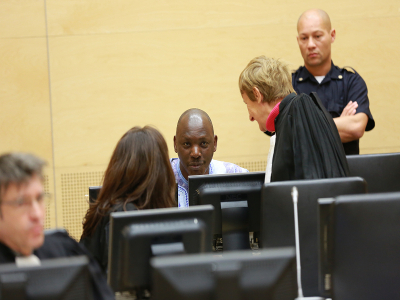During today's open session, Judge Erkki Kourula, Presiding Judge in this appeal, read a summary of the Appeals Chamber judgments.
The Appeals Chamber rejected Mr Lubanga's allegations that the proceedings were unfair and found that Mr Lubanga did not substantiate several grounds of appeal he raised. The Appeals Chamber established, with respect to factual errors, that it would not assess the evidence anew, but would intervene only if the Trial Chamber's assessment of fact was found to be unreasonable. In applying this standard, the Appeals Chamber rejected, among others, the alleged errors in the Trial Chamber's findings relevant to the age of the child soldiers.
With respect to the alleged legal errors regarding Mr Lubanga's individual criminal responsibility, the Appeals Chamber confirmed the Trial Chamber's approach that a co-perpetrator must make an essential contribution and does not need to personally and directly commit the crime.
With respect to the Prosecutor's and Mr Lubanga's appeals against the Sentencing Decision, the Appeals Chamber held that a Trial Chamber enjoys broad discretion in determining a sentence. The Appeals Chamber rejected all the grounds of appeal raised by the Prosecutor and Mr Lubanga, finding that the sentence was not disproportionate to the gravity of the crimes and reflected Mr Lubanga's culpability for the crimes for which he was convicted. Accordingly, the Appeals Chamber confirmed the total sentence of 14 years.
Judge Sang-Hyun Song adopted a partly dissenting opinion in relation to the appeals against the verdict and the sentence. While agreeing with the majority's decisions to reject the appeals, he disagreed with the Trial Chamber's holding that the "enlistment", "conscription" and "use to actively participate of in hostilities" of individuals under the age of fifteen are three separate crimes. Regarding sentencing, he found that the Trial Chamber should not have imposed three separate sentences for three crimes, but only one sentence for one crime.
Judge Anita Ušacka adopted a dissenting opinion with regard to Mr Lubanga's appeal against the verdict. She respectfully disagreed with the decision of the majority of the Appeals Chamber to confirm the Conviction Decision, which she would have reversed on the grounds that (i) the charges of which Mr Lubanga was ultimately convicted were not sufficiently detailed, and (ii) it was not established beyond reasonable doubt that the children conscripted, enlisted or used in hostilities by the UPC/FPLC were under the age of fifteen. Accordingly, she also disagreed with the conclusions of the majority with respect to sentencing.
Related articles
- • DRC and Rwanda Sign Declaration of Principles for Peace in Eastern Congo (April 25, 2025)
- • European Union Sanctions Rwanda and M23 Officials over Congo Conflict (March 17, 2025)
- • Canada and Germany Impose Sanctions on Rwanda for Supporting M23 Rebels (March 4, 2025)
- • UK Suspends Financial Aid to Rwanda Over M23 Rebellion (February 25, 2025)
- • Tshisekedi Announces Government of National Unity and Calls for Unity Against M23 Rebels (February 23, 2025)
- • UN Security Council Calls on Rwanda to Stop Supporting M23 Rebels in DR Congo (February 22, 2025)
- • Rwanda-Backed M23 Rebels Summarily Executed Children in Bukavu, UN Reports (February 19, 2025)
- • 'Deadly environment' plus 'political and social' obstacles hinder Ebola fight, Security Council hears (July 24, 2019)
- • Ebola outbreak declared an international Public Health Emergency (July 17, 2019)
- • Jean-Pierre Bemba named MLC presidential candidate (July 13, 2018)
- • At least 30 dead after massacres in Ituri (March 2, 2018)
- • Peacekeepers, Congo Army to Resume Joint Fight Against Rwandan Rebels (January 28, 2016)
- • Political tensions 'running high' in DR Congo ahead of 2016 elections (October 7, 2015)
- • UN Report Blames Ugandan Islamists for 237 Killings in DR Congo (May 14, 2015)
- • DRC Army Putting Pressure on FDLR (April 1, 2015)
- • ICC Case Against Bemba Wrapping Up as Another Opens (November 12, 2014)
- • Southern African Leaders to Meet in Zimbabwe (August 15, 2014)
- • ICC confirms war crimes charges against Bosco Ntaganda (June 10, 2014)
- • ICC sentences Germain Katanga to 12 years (May 23, 2014)
- • Kerry Calls on Kabila to Honor Constitution (May 4, 2014)
- • Security Council extends UN mission, intervention force in DR Congo for one year (March 28, 2014)
- • ICC finds Germain Katanga guilty of war crimes and crime against humanity (March 7, 2014)
- • Bosco Ntaganda Attacked Civilians on Ethnic Grounds, ICC Prosecutor Says (February 10, 2014)
- • New DR Congo amnesty law welcomed by UN envoys (February 5, 2014)
- • Kabila Congratulates Congo Army for Defeating M23 Rebels (October 30, 2013)
- • Congo Army Takes Control of Kibumba After Fighting With M23 Rebels Resumes (October 25, 2013)
- • U.S. Sanctions Rwanda Over Use of Child Soldiers by M23 Rebels (October 4, 2013)
- • Rwandan Support for M23 Rebels Frustrates Attempts to End Fighting in Eastern Congo (September 26, 2013)
- • Dozens of M23 Rebels Killed by Congo Army in Renewed Fighting (August 22, 2013)
- • UN mission sets up security zone in eastern DR Congo, gives rebels 48 hour ultimatum (July 30, 2013)








